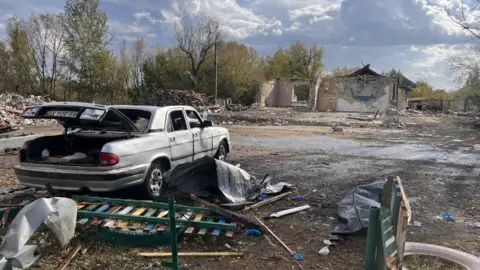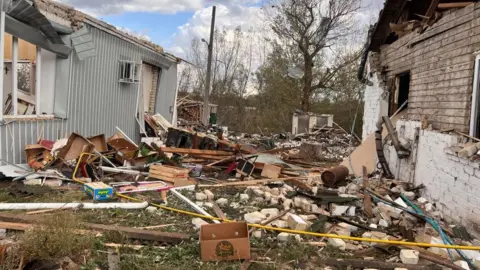Ukraine war: Blood stains visible in the soil as village of Hroza mourns
The unusually large collection of vehicles and people tells you something significant has happened in the tiny village of Hroza.
After driving for hours through Ukraine's endless rural expanse, it is a jarring sight.
Such is the force from a ballistic missile, it is not always immediately obvious where the missile hit.
But, as the odour of burning still taints the air, you turn a corner to find the remaining walls of what was once a café and grocery shop.
The missile struck during a wake attended by many in the village - for what this also was, was a son's attempt to rebury his father after he was killed and buried in occupied territory last year.
Now he, his wife, and 49 others are gone too - a fifth of Hroza's population killed in one go.
Every family in the village in north-eastern Kharkiv region has been affected, Interior Minister Ihor Klymenko says.
 Scarlett Barter/BBC
Scarlett Barter/BBCThe café and grocery shop are somehow still standing. Different wallpaper patterns show how most of the building has disappeared.
Latex gloves used by medical teams litter the adjacent playground where most of the bodies were recovered.
Blood stains are still visible in the soil.
Eerily, the swings and slide are still there. Symbols of innocence against a desperate backdrop.
A covered body lies next to a collection of candles on a tractor tyre. A memorial to the 52 lives taken in an instant yesterday.
Down a neighbouring bumpy road, we meet the imposing frame of Andriy. He tells us his wife Lyubov was at the funeral wake yesterday afternoon and that he doesn't know what's happened to her.
Andriy was out at work at the same time.
"We can't find her," he says. "We haven't seen her dead, we haven't seen her alive, we just don't know what to do."
Lyubov's father went to the police station to give a DNA sample in the hope she might at least be identified.
 Scarlett Barter/BBC
Scarlett Barter/BBCThe local prosecutor is adamant this attack was deliberate. The apparent use of a ballistic missile, which are fairly accurate, reinforces that claim.
What also backs that up, is how locals say the village is typically spared from the frequent shelling other settlements must endure.
Russia has not directly commented on the strike.
But Ukraine's defence ministry blames Russia for the attack, adding there were no military targets in the area.
It is likely the funeral wake of a Ukrainian soldier was the main motive for this strike.
The prosecutor is keen to show me the phone footage he captured when he first arrived yesterday. It is pretty hard to watch, but "people need to see" he said.
With a local population of just 300, the impact of this attack goes beyond this blast zone.
